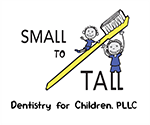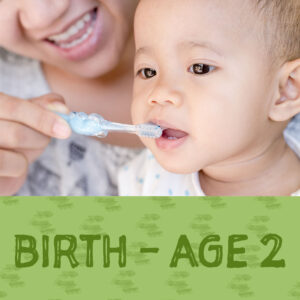Birth – Age 2
Baby teeth are important. Good, healthy baby teeth will pave the way for good healthy adult teeth. And by helping children to take good care of their teeth, you are starting habits that will last them all their lives.
When a baby is born, the first set of teeth is already there, just under the gums. The arrival of a baby’s first tooth is always an exciting time! The front teeth usually begin to come through the gums between six and twelve months. Over the next 2 years the remaining ‘baby’ teeth will appear. By the time a child is 3 years old all 20 baby teeth will have arrived. These teeth are very important for eating, talking and smiling. They also keep spaces for the adult teeth.
Before your baby has teeth, clean the baby’s mouth with a soft cloth or infant toothbrush every day. This helps ready the baby for the teeth cleaning to come. When the teeth start cutting in, clean the child’s teeth twice a day with a toothbrush designed for small children. Use only water on the toothbrush, do not use toothpaste until your child has been seen by the dentist for their first check-up, which should be around their first birthday. Change your child’s toothbrush every 3 months when the bristles start to fray, and also after your child has been ill. Use a gentle massaging back and forward motion and make sure you bush the front, back and sides of the new teeth.
The age a child begins teething varies from as early as 2-3 months to as late as 36 months. Some children have a lot of irritability when cutting their first teeth, whereas others seem to sail through without many issues. The best way to handle teething pains are by gently brushing the gums over and around the erupting teeth. This ensures the gum and tooth are clean and helps to reduce inflammation during the teething process. Over-the-counter pain relievers such as Tylenol or Motrin are helpful for settling the irritable baby, and some infants find relief from biting on a cold teething ring or wet wash cloth. Contrary to popular belief, teething does not cause fevers. If your child is experiencing a fever and is also teething, make sure you have the child evaluated by their primary physician as teething is most likely not the cause.
Baby teeth are important because they allow the child to chew solid foods, are necessary for speech development and are needed to smile! The baby teeth also help the jaws grow correctly and guide the adult teeth into the correct position in the mouth. A cavity can develop quickly in a baby tooth because it is much smaller and thinner than an adult tooth. The bacteria that cause cavities can spread from the baby teeth to the adult teeth causing many dental problems for the child as they mature. If a baby tooth is lost prematurely because of a cavity or an infection, the teeth on either side of the “lost one” can begin to move, which may force the adult teeth to grow into the wrong position in the mouth, resulting in crooked teeth and abnormal bites. While its true that baby teeth do eventually come out, many parents are surprised to learn that the baby molars do not come out until age 10-12, meaning that kids have many of their baby teeth for 10 years! So, yes it does matter that we take care of our children’s baby teeth!
Babies and toddlers have different built-in needs to suck and feel soothed and comforted by sucking/suckling. When the sucking intensity and frequency is high, there is more impact on the development of the mouth and the dental bite. The oral development of some children is affected so severely that there is difficulty with speech and language development, or even with being able to chew solid food properly. Pacifiers should be discontinued before the third birthday or sooner if the bite is severely affected. Thumb and finger habits are more challenging to control in young children as it is almost impossible for a child to develop sufficient self-control to discontinue the habit before age 5. Once the front baby teeth have fallen out it is extremely important that the habit be discontinued, so that the mouth may grow correctly. Some of the damage caused by habits may spontaneously correct once the habit is discontinued, but some children need the help of an orthodontist to help correct the damage to the developing bite.
Breastfeeding has been shown to be highly beneficial for a baby’s health and development. However, if the child is breast fed frequently once teeth appear in the mouth, the child is at risk for tooth decay. Children who sleep in the family bed and breast feed on demand are at greater risk for developing tooth decay. To prevent this disease, we encourage mothers to clean the baby’s teeth as soon as they appear in the mouth. A gentle massage with a wet toothbrush or a wet washcloth before and after breast feeding if possible is encouraged. A baby tooth can quickly build up plaque from the sweet breast milk, and start to decay as soon as it enters the mouth. At Small To Tall Dentistry, our pediatric dentists are trained to recognize the very early signs of tooth decay, and can guide you to prevent more serious disease from developing. For this reason we encourage all parents to bring their child to the dentist by age 1, or 6 months after the first tooth appears in the mouth. Early dental visits and prevention is the key to a healthy, beautiful smile!
Call us and make your appointment today. We can work together to make sure your child is cavity-free.
Bottles and sippy cups should be offered with either milk or water. Parents are encouraged to restrict the young child from sweet drinks and juices which help to develop bad habits and a desire for sweetened foods. The sugars and acids in juices (even whole fruit or 100% fruit juices) are highly destructive to baby teeth and are the cause of many children suffering dental decay. Children should be trained to sit down when they take their drink, and to finish the entire cup or bottle at one sitting. Unless the bottle or cup contains water, exposing the teeth to small amounts of milk, formula or juice over a prolonged period of time places them at risk for developing tooth decay. To prevent this disease we encourage mothers to limit their children’s’ exposure to sweetened beverages and to maintain meticulous oral care by cleaning the child’s mouth with a wet toothbrush or washcloth after feeding, and offer a bottle or cup with plain water during the night time.
Sippy cups with spouts should be discontinued by age 3. Children should not be allowed to walk around while drinking from spouted cups as they have been known to cause oral injuries during trips and falls.






